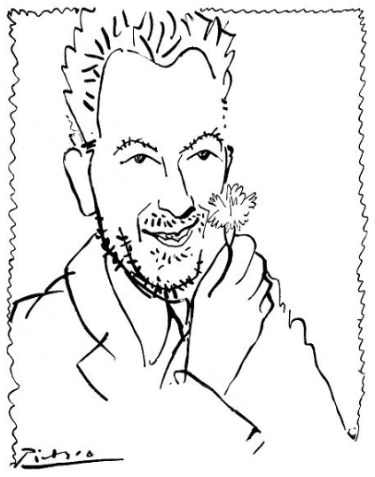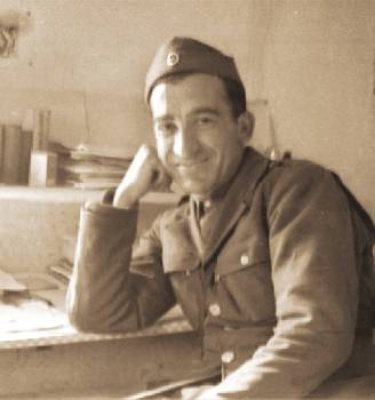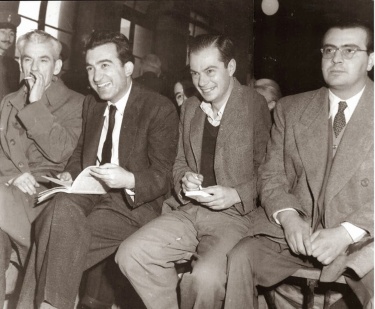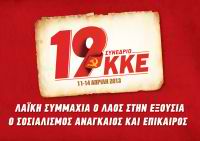Links to the old web pages of KKE
Information on Nikos Belogiannis, Hero of the People, member of the Central Committee of the KKE

“We believe in the most correct theory which has been conceived by the most progressive minds of humanity. And our effort, our struggle, is that this theory becomes a reality in Greece and the entire world (…) We love Greece and its people more than our accusers (…) Precisely because we struggle so that our country will see better days, without hunger and war (…) and when it is necessary, we sacrifice our lives.” (Nikos Belogiannis, part of his defense speech at the military tribunal)
Nikos Belogiannis was born in 1915 in the village of Amalia (Peloponnese), the son of a poor craftsman. As a high school student and later a student at the University of Athens, he was involved in the progressive movement of young people. N. Belogiannis joined the Organization of the Communist Youth of Greece (OKNE) and in 1934 the Communist Party of Greece (KKE). He was expelled from the Faculty of Law of the University of Athens for his revolutionary activities. In 1934-36 he was the organizer and leader of a number of party organizations in the Peloponnese. In March and August 1936, he was arrested for revolutionary activity. In July 1937 he escaped from prison. In May 1938 he was again arrested and sentenced to five years in prison and two years of exile.
The period of Nazi occupation

The Pro-fascist Greek authority after the occupation of Greece handed over Nikos Belogiannis and other communist prisoners to the German and Italian fascists. It should be noted that of the 17,000 communists no more than four thousand had survived until the beginning of the German occupation and 2000 of them were in prisons and concentration camps on the islands of the Aegean Sea. However, a few hundred communists, taking advantage of the confusion of the authorities were able to escape in 1941 from prison. Among them were members of the Party’s Central Committee, but N. Belogiannis was unable to escape to freedom.
It should be noted that prior to the occupation the king and the leaders of the bourgeois parties had left Greece. Despite the fact that there were only a few thousand people in the ranks of the KKE and most of them were in the prisons and camps the party took the initiative and created the first national liberation organization "National Solidarity", which aimed to assist the victims of war and of the Nazi occupation. It included the organization of the Greek Red Cross, progressive intellectuals, part of the clergy and a large number of women. Ignoring the strict orders of the occupation authorities and the puppet government, members of the organization helped the wounded soldiers and made a special effort to save people and especially children from starvation. Before the end of the war through donations it had created hundreds of health centres, over 1,200 people’s pharmacies, 90 convalescent centres, 73 people's hospitals, a large number of kindergartens, nurseries and children's homes. Over 1 million people received assistance from the organization of "National Solidarity".
On May 31, 1941 the Central Committee of the KKE called for a popular front against the invaders. The large Greek bourgeois parties immediately rejected the call of the KKE and declared that the best way to save the people was a "wait and see" stance. The first to respond to the call of the Communist Party were the mass organizations of the working class - the trade unions. On July 16, 1941 the Workers National Liberation Front (EEAM) was founded, and on September 28, 1941, with the participation of the KKE and several small parties, the National Liberation Front (EAM) was formed. For several years, EAM was transformed into the largest mass organization that has ever existed in Greece. Despite the ban and hundreds of victims, EAM organized during the Nazi occupation a number of very big strikes and mass demonstrations, they were larger in scale than in any country under the German - Nazi occupation.
In January 1942 the Central Committee of KKE and EAM Central Committee issued a decision to establish a regular guerrilla army, the Greek People's Liberation Army (ELAS).
EAM and ELAS fought against the German, Italian and Bulgarian fascists. The latter operated in northern Greece, and threatened its territorial integrity.
In September 1943 Nikos Belogiannis escaped. In 1943-44 he was involved in party and partisan work in the area of Patras as the political commissar of the 3rd Division of the People's Liberation Army of Greece (ELAS). In the same period (before 1944) ELAS liberated many mountain areas of the country, where the People's Government (PEEA) was established, organs of popular power, the committees and the courts. In August and early September 1944, when the victorious Red Army moved into the Balkans, ELAS had passed into a general offensive against the fascist forces. While the regular army ELAS had in its ranks 78,000 officers and men, who were battle-hardened. In addition to these forces there was an organization of reservists, about 50 thousand people and the national militia of six thousand people. There were more than 1.5 million members organized in EAM, of which 400 thousand were members of the KKE and about 400 thousand members of the youth anti-fascist organization EPON.
ELAS completely liberated Greece. After the liberation of Greece, Nikos Belogiannis became head of the department of the ideological work of the Party organization of KKE in the Peloponnese. He edited the magazine "Free Morias" and simultaneously worked on two books "Foreign capital in Greece" (only published in 1998 by "Sinchroni Epohi") and "History of Modern Greek literature."
In Greece, the arrival of foreign troops, mainly British began.
Civil War

The civil war was imposed on the Greek people by the imperialist circles of Britain and the United States, as well as by the reactionary forces of Greece in order to maintain the political and socio-economic order, which existed in Greece before World War II. This had dire consequences for the country.
In this unequal contest the people’s forces were represented by the People’s Democratic Army of Greece (DSE). The Democratic Army of Greece (DSE) was established in October 1946 in response to a bloody terror, which was launched in Greece in December 1944 by the bourgeois reactionary forces and foreign troops against fighters of the national anti-fascist movement.
By the end of 1947 the DSE maintained the initiative in the fight. In the summer of 1947 the operation of the "national" army failed to destroy the DSE. The DSE forces repelled the enemy and inflicted on it a number of serious military defeats. In general, the "national army" was forced onto the defensive. The ruling class was worried that its plans may fail, because Britain was not prepared to continue its intervention in Greece. The United States came to the assistance.
On June 20, 1947 an agreement was signed between Greece and the United States, according to which supreme power in Greece was transferred to the U.S. President. They stated that the Greek government will implement any request from the President of the United States, of course, in the name of the "security" of the country.
In Greece, hundreds of ships with modern military equipment arrived to upgrade the "national army". On February 24, 1948 the U.S. General Van Fleet arrived in Athens . He became the head of the "national army". Five thousand American military officers and advisers began to oversee the "national army" and purged officers and soldiers in its ranks.
They created a "dead zone" in the regions where the DSE operated, as a million peasants were forcibly expelled from their homes so that the DSE partisans could not use their help. The "national army" had been retrained and prepared for "mountain warfare". On the other hand, the efforts of the DSE and its adjustment to the new situation could not change the situation: By the summer of 1948, when the main battle took place, the correlation of forces between the DSE and the "national army" was 1 to 10, with regard to manpower, and 1 to 50 with regard to military equipment. An overwhelming advantage in favour of the enemy. The DSE did not have planes or tanks. In addition, the Americans first used Napalm bombs there, which were more widely used during the Vietnam War. Only in one battle on Grammos, they dropped 338 Napalm bombs on the DSE’s positions.
In spite of the unequal correlation of forces, the final battle (Grammos and Vitsi) was fierce, and it is no accident that it is still taught today in military academies in Greece and the United States.
When the battle was still in progress Nikos Belogiannis wrote: "A basic characteristic of the Grammos battle was the major difference in human and material resources between the two opponents. The foreign imperialists provided monarcho-fascists with abundant cannons and aeroplanes… this difference was wiped out by the political and moral superiority of the fighters and cadres of the DSE who today are writing the most glorious pages of our history fighting for a new Greece of people’s democracy.”
During the Civil War (1946-49 gg.) Nikos Belogiannis was conducting political work in the army of the Democratic Army of Greece (DSE). In 1947 he became head of the Propaganda Department of the DSE. In 1948-49. political commissar of the 10th Division of the DSE. He was wounded in battle in 1948.
The civil war lasted until August 1949. The struggle of the DSE was heroic and it was the first anti-imperialist struggle in the world after World War II. Despite the heroism of the soldiers of the DSE, due to the inequality of the forces fighting, the war ended in defeat for the people's army.
During the battles of the Civil War 50 thousand people were killed. 6500 communists and democrats were shot after being sentenced by military tribunals. 50 thousand anti-fascists were imprisoned and exiled, many were subject to appalling torture. 100 thousand Greeks, DSE fighters and their families, were forced to leave the country after the defeat of the DSE. The main part of them received political asylum in the Soviet Union and other European socialist countries.
After the defeat of the DSE in September, 1949 N. Belogiannis, along with thousands of armed men went to the socialist countries of central and Eastern Europe. In Greece, a violent anti-democratic regime was installed, which was completely politically, economically and militarily dependent on Anglo-American imperialism.
In 1950 N. Belogiannis was elected as a member of the Central Committee of the Communist Party of Greece (KKE).
The arrest and execution of N. Belogiannis

The 6th and 7th plenary sessions of the CC, which took place in the same year, decided to adapt the tactics of the party to the new situation, i.e. defeat in the Civil War. Thus, the resolution of the plenum stressed the need to transfer the core of the party’s work from armed struggle to peaceful mass political activity. It promoted the political task of reconciliation and the struggle for "bread for the people" and against the imprisonment of Greece in the new imperialist shackles of U.S. and NATO. At the same time it stressed that the party should establish a robust mechanism for the underground work in Greece and at the same time to use all possible legal methods of struggle.
In June 1950, Nikos Belogiannis after the decision of the Central Committee of the Communist Party of Greece, arrived in Greece illegally, using false documents and passport. He was to inform the party forces in Greece about the new party line and to reorganize the underground network of party organizations in the country. It should be noted that N. Belogiannis was not the only party cadre who illegally entered Greece then. Hundreds of Communists entered, with different goals, Greece in that period. Many people, after carrying out their tasks, again left the country, but many people were arrested by the authorities. Such missions were considered to be an honour in the party and there were many letters to the Central Committee of the party requesting to direct them regarding underground work in Greece.
In one of the first messages that Nikos Belogiannis sent abroad to the leadership of the party, he wrote: "I'm clearing and reorganizing what is already there, and at the same time creating a new organization. Many possibilities, optimistic prospects."
Nikos Belogiannis was arrested in December 1950 and a particular role was played by the recently founded American organization - the CIA. The police announced his arrest on January 5, 1951. It is no accident that the only left legal newspaper "Democrat," was outlawed a short while beforehand. It was published with the help of the underground Communist Party.
Despite the arrest, his work and the whole work of the underground party organization bore fruit: In the country a general movement for a general amnesty, the elimination of "death camps", the abolition of "emergency" legislation was spreading. The working class strike movement started to develop.
100 thousand Greek people had signed the Stockholm Appeal of the World Peace Council, despite the terror and the murder, on March 5, 1951 in Thessalonica, of the communist Nikos Nikiforidis, who had been collecting signatures.
In July 1951 on the initiative of the underground KKE, the United Democratic Left coalition was founded (EDA). It is characteristic that when the parliamentary elections took place on September 9, 1951, of the 10 members of parliament elected on the lists of EDA, seven were political prisoners and exiled democrats, among them the ELAS Commander General C. Sarafis, the well-known trade union leader and communist Ambatielos and others. After these results, the authorities cancelled the parliamentary seats of the democratic political prisoners.
On the October 19, 1951 at an extraordinary tribunal the first lawsuit against N. Belogiannis began. There were another 92 members of the Communist Party of Greece (KKE) alongside him on the dock. They were all accused that they had violated the law number 509, passed in December 1947, which banned the KKE and "communist propaganda". It should be noted that at this time in the government of Greece were not rightwing but "centrist" forces. On November 16 an extraordinary tribunal (in which G. Papadopoulos participated - the future head of then Colonels’ Junta 1967-1974.) sentenced Belogiannis and 11 other communists to death. However, the sentence was not executed because it was clear that the process and the verdict were purely political.
The authorities had to "hold" a new trial-parody, with new charges, "to prove the sabotage" of the communists, that they allegedly worked against the interests of Greece and betrayed its interests, serving a "third" power.
The underground KKE used to communicate with the leadership of the party located abroad using radio. Police uncovered two such related sites in Athens and, thus, a new "Belogiannis case " was trumped up in the new trial , this time at a regular tribunal with the false accusation of "spying" (violation of the law 375 of 1936). The second trial-parody began on February 15, 1952. On March 1, 1952 a verdict was arrived at which sentenced Nikos Belogiannis and 7 other communists to death.
Immediately in Greece and the whole world a movement arose against the new death sentences. The lawyers asked the king to pardon their clients. At the same time, the U.S. demanded that the government and the king carry out the execution of the sentence. On Saturday, March 29, 1952 late in the evening King Pavlos rejected a request for clemency for N. Belogiannis and his comrades. After midnight on Sunday, March 30, dozens of people who were "on duty" at the entrance to the prison to stop the transfer of those sentenced to death to the place of execution departed , as they were not aware of the decision of the king and the government. They left because even the Nazi Germans did not carry out planned executions on Sundays. The executioners arrived at the jail and took four people to be shot. These were: Nikos Belogiannis, Dimitris Batsis, Nikos Kaloumenos, Ilias Argiriadis. They were taken to the place of execution and shot under the lights of the military trucks and jeeps, as it was still dark and everything had to be carried out quickly, before the news spread to Athens.







